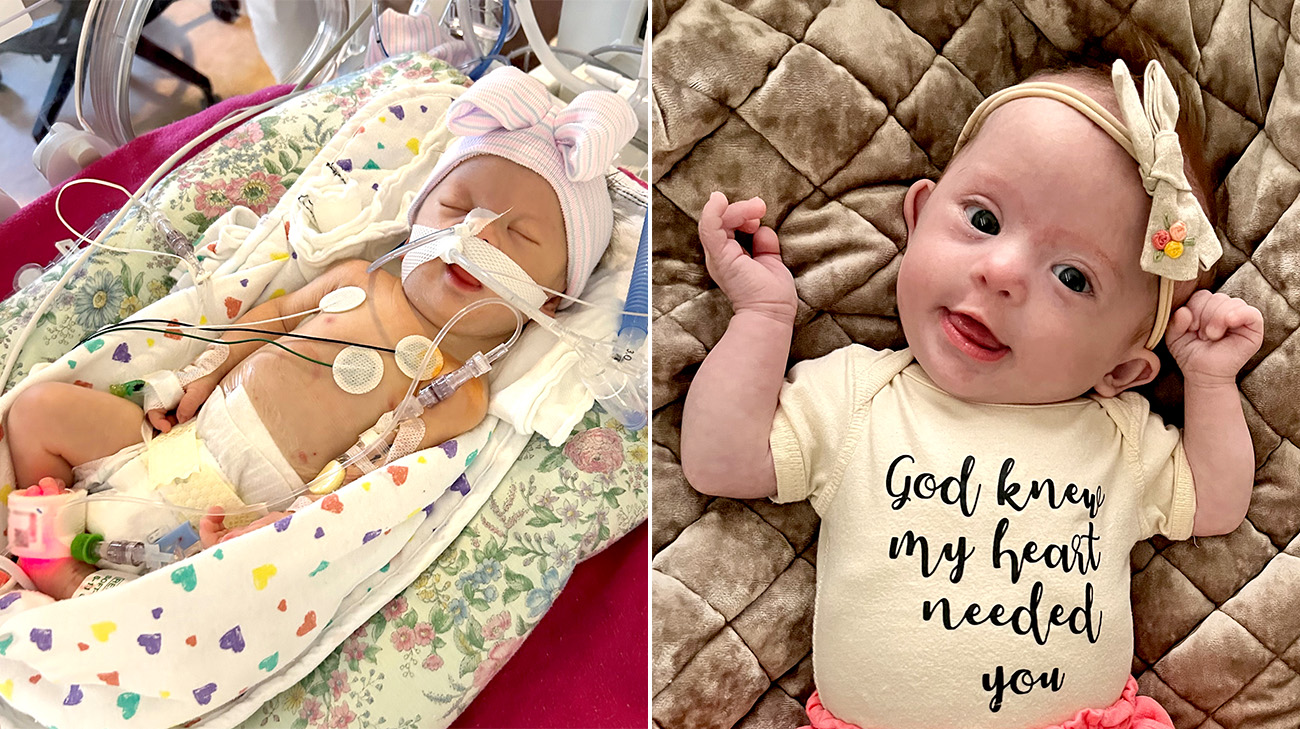
Sophia Quiring’s mom describes her as a happy baby who loves music and has this special power of being able to take all your worries away. Looking at her now, you wouldn’t know the 6 month old underwent major surgery one day after she was born. That’s because her care team was able to perform the procedure laparoscopically, meaning minimally invasive.
“Everyone is blown away because you can't even see her incisions. It's crazy. It's like they're not even there,” says Sophia’s mom, Jessica Quiring of Strongsville, Ohio.
A few months into her pregnancy, Jessica received a series of difficult news. The first came when she underwent a nuchal translucency test, which is an ultrasound that measures the amount of fluid behind an unborn baby’s neck. A small amount of fluid is normal, but more fluid in this area could indicate Down syndrome or other congenital conditions.
“With two other children, I’ve done this type of ultrasound before. But this time, I noticed it was taking longer than it typically would,” says Jessica.
After an abnormal finding, further testing confirmed Sophia has Down syndrome. Following this news, it was suspected she had a rare type of duodenal obstruction that’s been associated with Down syndrome. The condition impacts the duodenum, or the first part of the small intestine, and can prevent or limit food and fluids from passing through the digestive system.
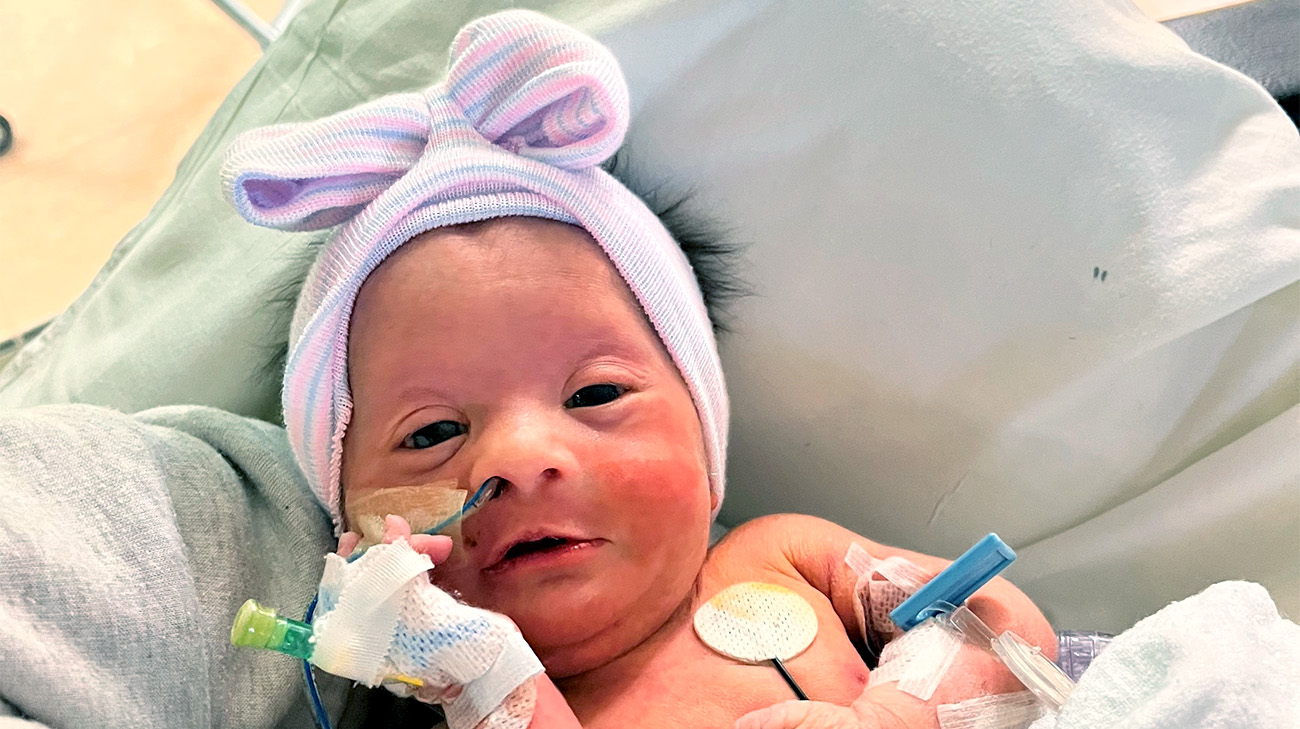
Sophia was born in March 2024, and her care team had a plan in place to address her rare type of duodenal obstruction laparoscopically. (Courtesy: Jessica Quiring)
Since it was anticipated this would keep her from feeding normally after she was born, Jessica’s Ob/Gyn and maternal-fetal medicine specialist Ahmed Ahmed, MD, referred her to Miguel Guelfand, MD, the section head of Pediatric General and Thoracic Surgery at Cleveland Clinic Children’s. Dr. Guelfand planned to address the issue laparoscopically.
“The benefit of doing a minimally invasive procedure is the patient has a faster recovery time compared to standard surgery. There’s less trauma because you don’t have to cut any muscle or structure,” says Dr. Guelfand. In addition, there’s a lower risk of infection, the patient has less pain following the surgery and is left with mini or unnoticeable scars.
Leading up to the surgery, Jessica says Dr. Ahmed worked closely with her during her pregnancy to make sure both she and Sophia stayed healthy. At one point, Jessica was in the hospital multiple times a week because Sophia was experiencing issues with her heart rate and blood flow before birth.
“Dr. Ahmed would always tell me it was like a game of ping pong because her blood flow would be good at one appointment and not the next. While managing this, he weighed how long she could safely stay inside before she needed to be delivered,” says Jessica.
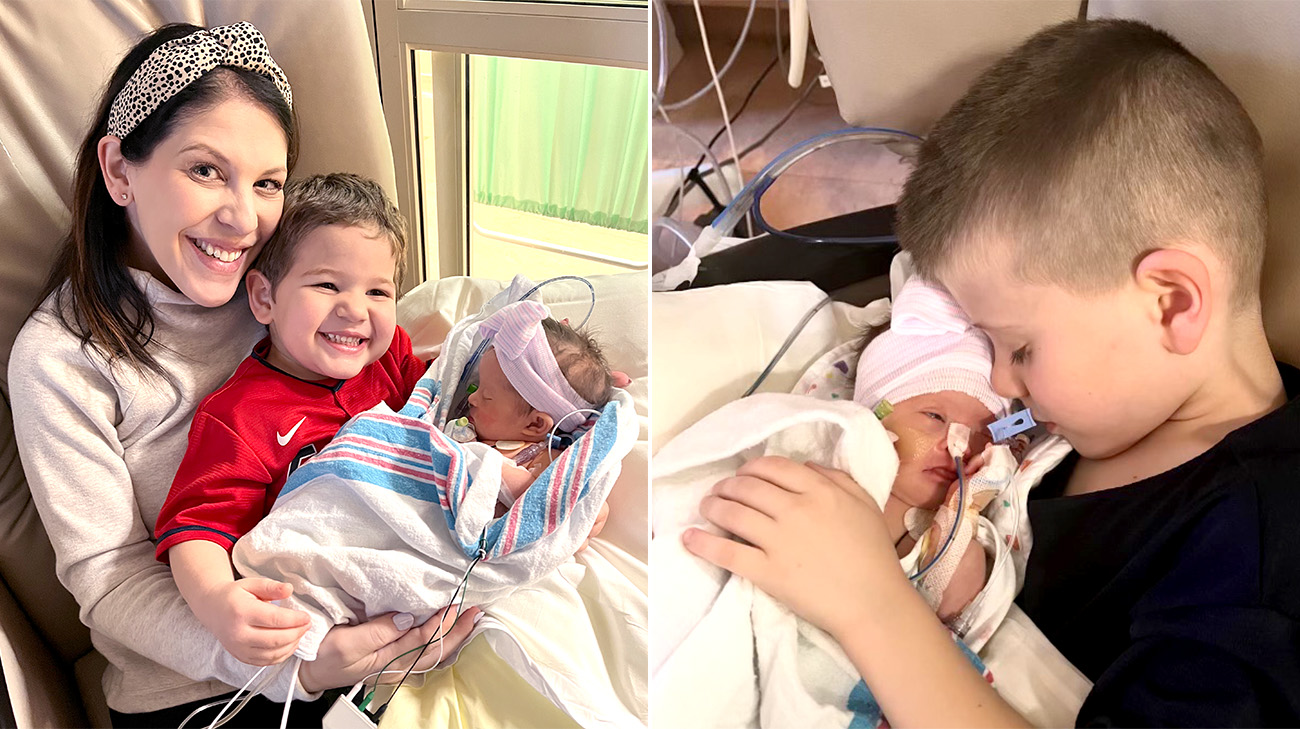
While in the hospital, Sophia had support from her entire family, including her two older brothers. (Courtesy: Jessica Quiring)
In March 2024, the time came – Jessica delivered Sophia at 36 weeks. She recalls that day being difficult because her daughter had to be promptly taken to the neonatal intensive care unit (NICU). Sophia went into surgery the following day.
“It was very emotional because I was handing my 1 day old off for a major surgery, but I knew Sophia was in great hands with Dr. Guelfand and his team. They kept me updated throughout the entire surgery,” says Jessica.
During the procedure, Dr. Guelfand explains they created a new connection to bypass the blockage in the duodenum that would ensure food would be able to pass through the digestive system without obstruction. Since the team was able to do this via a minimally invasive approach as planned, Sophia only required three small, 3-millimeter incisions – rather than having to open her abdomen completely. It marked the first time a laparoscopic procedure was performed to address this type of obstruction at Cleveland Clinic Children’s.
“Everything went amazingly well. Sophia’s pain management was minimal, and she recovered very quickly,” says Dr. Guelfand.
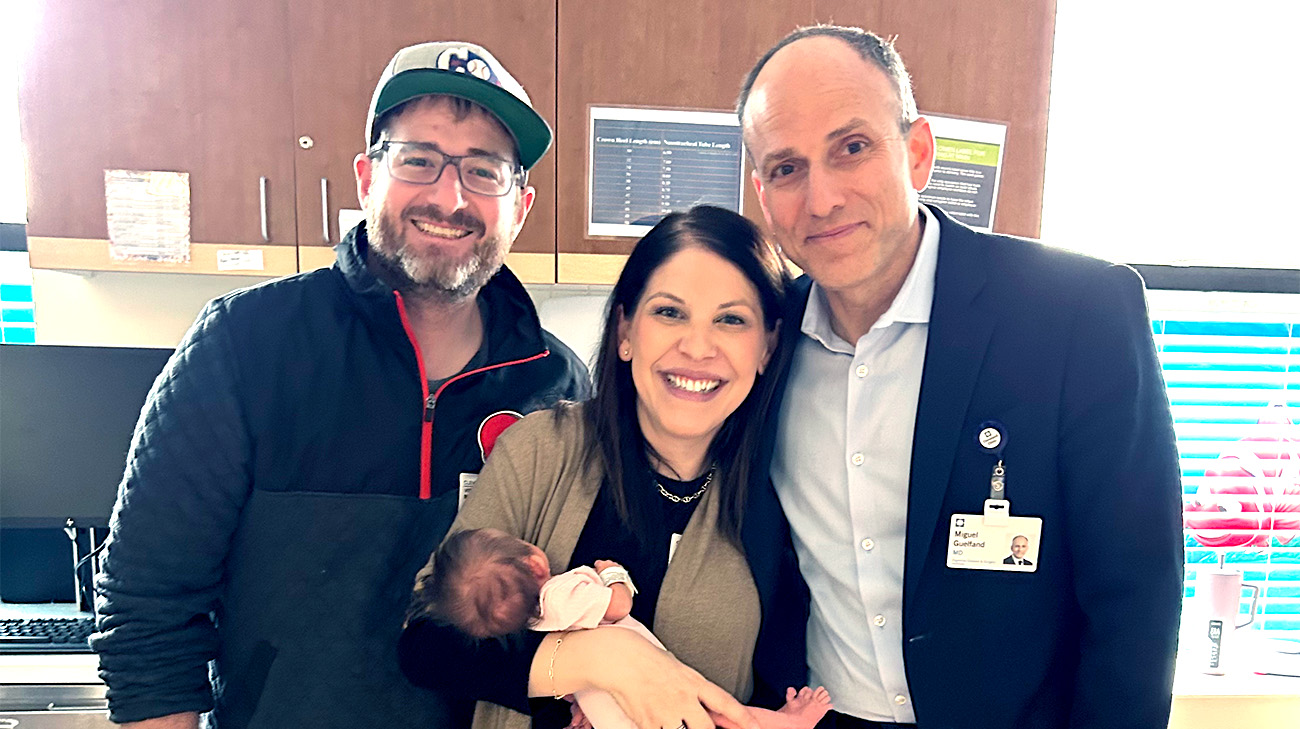
Sophia and her family with Dr. Miguel Guelfand, who Jessica says was there to support Sophia throughout her health journey. (Courtesy: Jessica Quiring)
Jessica adds, “Sophia was able to start her feeds within a day or two after surgery, which was a huge win. It's a testament to how she was able to heal and recover much faster than if she would have had a more invasive surgery.”
Jessica had expected Sophia to be in the NICU for at least one month, but she was ready to come home after 14 days following her surgery. From there, physical and occupational therapy sessions helped Sophia get stronger. She’ll now continue to follow up with Dr. Guelfand to make sure she stays on track. Looking back at this experience, Jessica says she’s thankful to everyone who’s cared for Sophia along the way.
“I can’t thank Dr. Ahmed enough. He watched both Sophia and I so closely leading up to her delivery, and Dr. Guelfand treated Sophia like she was one of his own,” says Jessica.
Dr. Guelfand adds, “Sophia's parents are amazing and worked well with the surgical and medical team. Sophia was always giving a smile and recovered very fast.”
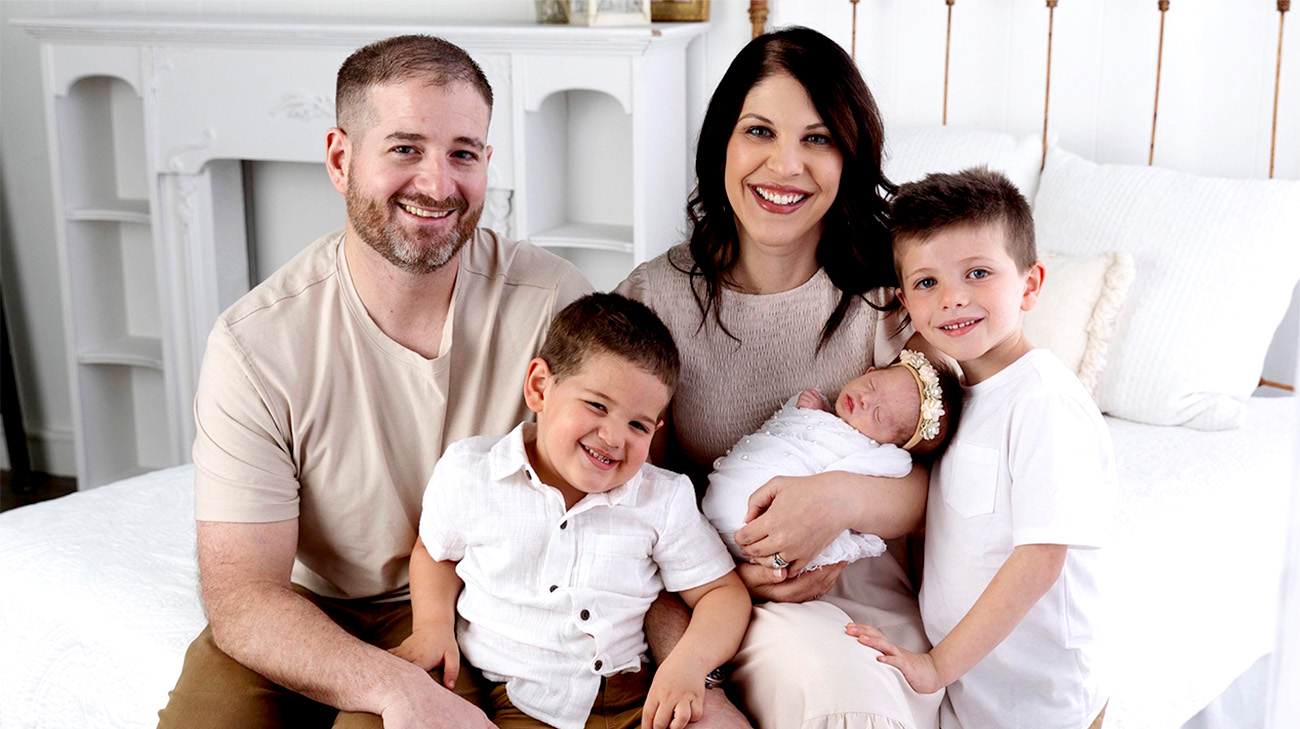
Sophia and her family are now looking forward to this next chapter as she continues growing and getting stronger each day. (Courtesy: Crystal Sparks Photography)
As Sophia continues growing, Jessica and her family look forward to creating new memories and celebrating each of her milestones. Jessica says she’s grateful to have Sophia at home with her two big brothers.
“We’re proud to be her parents and even more proud of her. She's a bright light, her strength is inspiring and she teaches you so much about life. We're excited to continue learning from Sophia and being able to watch her grow,” says Jessica.
Related Institutes: Cleveland Clinic Children's

